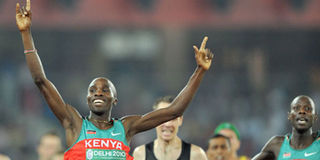After Delhi, Kiplagat now seeks world record

Kenya's Silas Kiplagat (L) wins the men's 1500m final of the Track and Field competition of the XIX Commonwealth Games on October 12, 2010 in New Delhi. AFP PHOTO / MANAN VATSYAYANA
He was branded a new kid on the block when he lined up against some of the world’s best track athletes at the 17th Africa Senior Athletics Championships in Nairobi in July.
This was despite having posted an impressive 3:29.27, season best, in the four-lap 1,500m race earlier.
In Delhi this month, Silas Kiplagat emphatically announced that he was no new kid when he won the Commonwealth Games 1,500m gold medal. Before the race, he had not attracted more than a passing glance.
Yet he had earlier obliterated a classy field, among them Africa 1,500m silver medallist Amine Laalou of Morocco and former Commonwealth Games 5,000m champion Augustine Choge, to win the IAAF Diamond League series in Monaco, where he posted his 1,500m career best.
The victory was no surprise for the dark horse, who donned the national colours for the first time during the Africa Championships at Nyayo Stadium. His glory was long in coming.
As a rookie, Kiplagat had floored seasoned runners and world beaters, among them world cross-country titleholder Joseph Ebuya, Sammy Kitwara and Olympian Nicholas Kemboi, to win the 1,500m final at the New KCC/Athletics Kenya track and field meeting in Eldoret last year.
Kiplagat trains under former world 3,000m steeplechase record holder Moses Kiptanui. World 3,000m steeplechase champion Ezekiel Kemboi, Sammy Kitwara and Olympic champion Brimin Kipruto are his training partners in Eldoret.
Now that he holds the Commonwealth Games 1,500m crown and is ranked among the top 10 on the all-time best, Kiplagat wants to go one better.
“After such a feat, I will just race in the IAAF cross-country Permit Meetings and the local series. I want to run a sub 3:28 in the next season, but I need enough time for this,” says Kiplagat, a Kenya Prisons warder.
In Eldoret last Thursday, he said: “When I saw none of my Prisons colleagues on the winner’s rostrum while our counterparts from Kenya Police and the Armed Forces took all the honour, I had to ensure Kenya Prisons also had a name.”
Kiplagat, a third born in a family of seven, said he harbours no interests in cross-country running and will only use the local meets for build-up ahead of next year’s IAAF World Championships in Daegu, Korea.
Inspired by the world 800m record holder David Rudisha and former 3,000m steeplechase all-time best Moses Kiptanui, Kiplagat now has lofty dreams.
“After the World Championships, I will attempt the world record. But I am aware of the stiff challenge posed by bigwigs Asbel Kiprop, Haroun Keitany and Augustine Choge,” he said.
Although still considered an upstart, Kiplagat has four wins this season. He bagged the Berlin Diamond League (3:30.61), Lile Grand Prix (3:33.50) and Monaco Diamond (3:29.27) series, and finished second (3:31.94) in Rieti behind Olympic champion Asbel Kiprop.
He wound up fourth (3:36.74) in the Africa showpiece in Nairobi before romping to victory at the Commonwealth Games in 3:40.51.
“My running 3:29 tells me that I can run better times. I know it’s possible, because even former world champion Bernard Lagat told me that I can make it. So I will definitely try and see if I can get close to the record.”
As is tradition with most Kenyan runners, Kiplagat overcame numerous hardships before he took up athletics. He came from a poor family of peasant farmers in a poor village in Marakwet.
“I used to hear of Moses Kiptanui and Kipchoge Keino, who still remain my role models. I want to reach the level these great men reached,” he says.
Kiplagat used to trek long distances uphill to Tot Primary School and the experience hardened him for running.
“Since we could not make it home for lunch, we used to carry ugali to school wrapped in leaves. We usually covered 30km to and from school. The practice was quite helpful when the Pokot cattle rustlers raided our villages,” said Kiplagat, who hails from Siboh village in Marakwet East.
He says when Kitwara won the 2008 Tecla Loroupe Peace race in Kapenguria, the whole village celebrated, which motivated him.
“I immediately started to train. Exactly two years later, I won in Monaco and I will ensure that my younger siblings get secondary education. I completed Form Four by the grace of God as our family faced financial limitations,” said Kiplagat.
Cut from a different material altogether, Kiplagat stands out from his running peers. He comes from an area world-famed for producing the best steeplechasers.
They include world champion Ezekiel Kemboi, Olympic champion Brimin Kipruto and three-time world champion Moses Kiptanui, among others.
The alumnus of Chebara High School in Marakwet in 2007 pays glowing tribute to world half-marathon sensation Sammy Kitwara, who inspired him to run.
“Kitwara saw me training at home and offered to take me with him to Eldoret, where I lived with him as I continued training. He provided me with running kit.
I owe my career to him because he brought me from nowhere to where I am now,” said Kiplagat, who had his maiden race as a pace setter for Kitwara in Rotterdam when he posted an impressive 58:58, the sixth best world all-time half marathon mark.
“That Kitwara ran 58:58 and we live together, sleep together in one room, eating the same food and training together was a huge motivation. It was great encouragement especially to my age,” says Kiplagat, 22.
Kiplagat was forced to terminate a contract with Dutch track and field manager Frans Denissen, who wanted him to concentrate on road races.




